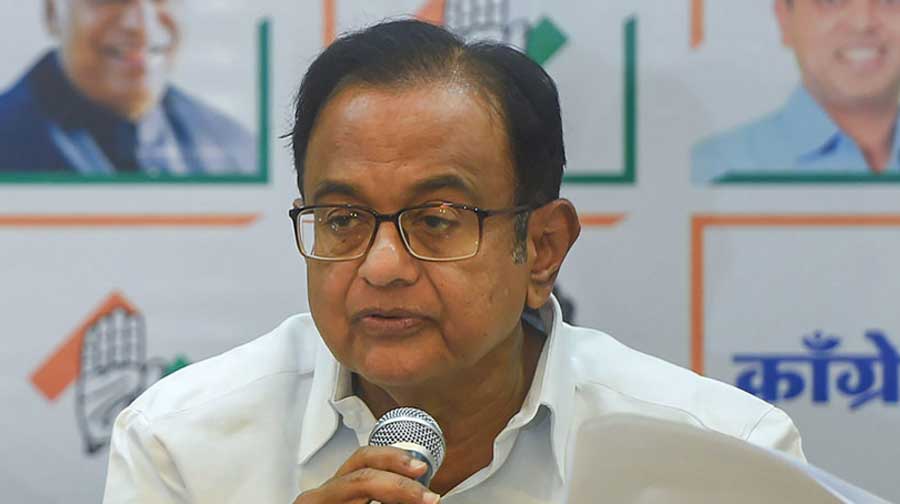First, it was billionaire banker Uday Kotak. Now it’s ex-Congress finance minister P. Chidambaram who has joined the print money club.
Chidambaram has told the government to “print money” if necessary to spur growth after what he called the “darkest year” for the economy in four decades.
This is “not the time to worry about the fiscal deficit,” Chidambaram told reporters in a video call. “This is the time to act boldly and decisively -- to borrow and spend (and) if necessary print money.”
“Spend on healthcare, spend on infrastructure, but spend and, as part of spending, spend on welfare measures, which today means cash transfers plus distribution of rations,” he said.
Chidambaram was speaking after government data showed that Gross Domestic Product (GDP) shrank 7.3 per cent in the financial year to March 31 from a year earlier.
“2020-21 has been the darkest year of the economy in four decades. The first two (quarters) witnessed a recession (contractions of 24.4 per cent and 7.4 per cent)... (and) performance in the third- and fourth-quarters did not herald a recovery," he said.
“We cannot lose another year like we lost the last year. The way the government is reacting it is like we are going to lose another year,” Chidambaram said.
The senior Congress leader’s call chimed with an appeal by Confederation of Indian Industry (CII) chief and billionaire banker Uday Kotak for the government to use fiscal “short-term steroids” to aid the economy’s recovery. Kotak, who’s the founder and managing director of Kotak Mahindra Bank, said last week the time had come for “the printing of money” by the central bank “to save the Indian economy for sustained growth.”
Like Chidambaram, Kotak urged that direct cash transfers be given to “the poorest of the poor for meeting their day-to-day needs” and that work programmes like NREGA be strengthened – moves, he said, were crucial to shoring up vitally needed consumption.
“We have to ensure the human (pandemic) cost is controlled and simultaneously the economic cost is given a breather so the economy can… bounce back,” Kotak said.
Despite fears that expanding the money supply can fuel inflation, there has been a record wave of money printing globally to combat the pandemic.
The country’s other main business group, FICCI, has also called on the government for a fresh fiscal stimulus package to offset the hit to household spending from soaring unemployment and Covid-19 health expenses.
“Most Indians now are poorer than they were two years ago,” adding “some 23 crore people have been pushed below the poverty line and into debt,” Chidambaram said.
He called “alarming” new figures from the Centre for Monitoring Indian Economy (CMIE) showing unemployment at close to 14.7 per cent in the week ending May 23, its highest level in a year, and noted the central bank has warned the economy faces the possibility of a crippling “demand shock.”
The pre-budget Economic Survey in January pegged economic growth for this financial year to March 31, 2022, at 11 per cent, billing it as a “conservative” forecast. But due to the upsurge in Covid-19 cases which began in March and warnings about a third wave, optimism has dimmed.
There has been a “sharp deterioration” in business confidence, FICCI reported. FICCI says business needs more low-rate lending, tax waivers and financial help as well as incentives like support for salary payments to avert layoffs.
India’s chief economic advisor K.V. Subramaniam insisted Monday that the overall economic impact of the punishing second wave was unlikely to be “large.” He conceded, though, that “economic activity is inextricably linked to the path of the pandemic” and that "the speed and scale of the second wave do lend caution" to talk about the extent of the economic recovery.
The Central Statistical Organisation (CSO) has already warned that macroeconomic estimates will likely “undergo sharp revisions” due to the “pandemic-led economic situation.”
Economists had been pinning their hopes for growth on a rebound in consumer spending but now they have started slashing their bullish forecasts. Moody’s Investors Service has cut its full-year forecast to 9.3 per cent from 13.7% projected earlier.
Chidambaram said the government had been selling “a false story” of “green (economic) shoots” and a V-shaped recovery. “If 2021/22 should not go as 2020/21, the government must wake up,” he said.











